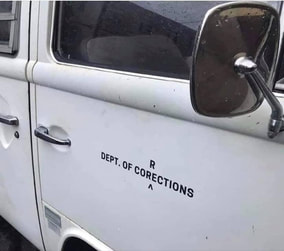|
I love the fact that most of you will immediately recognize this feeling. Are you brave enough to share in the comments what it was you did?
Feeling indignant over being suspected of a sin you did, in fact, commit.
0 Comments
 Sit tight, ma'am. Police are on the way. Sit tight, ma'am. Police are on the way. Something I see a lot of in my writing groups is authors asking (or demanding) permission. Can they ______ or can't they? This usually takes one of two forms. New Author A is timid. She wants to know whether she's allowed to make the cat in her memoir grey when it was black in real life, or whether she can start a sentence with "But" if she only does it once and prays for forgiveness afterwards. Author B is defiant. She says there are no rules in writing. She doesn't care about subject-verb agreement. She's written a 200k-word children's book and is looking for an agent. What they both want is for someone to tell them that it's OK to break the rules. OF COURSE IT IS. But it depends on what you mean by "OK." A refrain that will come up a lot in this blog, and that comes up a lot in my reports to writers is, "What are you trying to do?" The answer is a spectrum running from "I want to write because I enjoy writing," and "I want to write a bestseller and quit my day job." At one end of the spectrum, there are literally no rules.* Write in crayon. Write with no nouns. Have a sentient spatula as your main character. Break every odd-numbered rule in the Chicago Manual of Style. The pen and the keyboard belong to you, and you're in charge. This sort of creative chain-breaking is not only fun, but can often lead to some really, really good stories. For beginner and veteran writers alike, going into a story knowing you're not trying to publish, knowing you're not trying to impress, can be very freeing. See here for some fun rule-breaking creative exercises. The further you go toward the other end of the spectrum, the more the rules start to matter ... some. If you want anyone, even your grandma, to read what you've written, it better be written in a language they can read, and adhere to at least most of the basic grammar rules of that language. You can say that every word actually means its opposite, or that it's meant to be read backwards, but if your reader can't extract some meaning on their own, what exactly was the point of you sharing it with them? Again, you can do this, but remember my question: "What are you trying to do?" If you're trying to share a story with your grandma, and she can't read it, you've failed. (Although if your grandma is anything like mine, she's too kind to tell you this.) "BUT CORMAC MCCARTHY DOESN'T USE DIALOGUE TAGS AND LOOK HOW RICH HE IS!" It's true. He's quite rich. And he might fail a high school creative writing assignment. If he were my client, I'd probably send his stories back so marked up that it looked like an ink factory exploded. But his rule breaking works, and it works for two reasons. 1) He knows the rules and is breaking them deliberately. He knows how to use dialogue tags, and knows that not using them creates a greater intimacy and verisimilitude in his scenes. What did not happen was that, as he was learning how to write, he couldn't get the hang of whether the comma goes inside or outside the quotation mark so he just said, "Screw it, I ain't using 'em." 2) He has bought and paid for the extra effort it takes the reader to read his stories. I'll be honest: The first time I picked up Blood Meridian, I was put off. It's hard to read. His descriptions are really, really long, and when there's dialogue, it's really hard to track who's talking. But I pressed on because he has a dozen or so books published by a major publisher, a handful of feature films made from his books, and kajillions of fans worldwide. And it was worth it. I was quickly drawn in to the story, and good Lord, have you read it? Read it. I'm sorry to say, you likely don't have Cormac McCarthy's track record (yet). Is your book so good that it will reward your reader for putting in the extra work to read it? Are you sure? Even if it is, unless you've already built up some sort of cache with your readers, they're not going to give you the benefit of the doubt. As soon as it gets difficult, or unclear, they're going to get off the boat and they're likely not going to get back on. Does that mean that you have to sell your soul to make it? That you have to give up your unique voice in order to get published? No. But it does mean that you're going to have to be extra, extra careful to make sure that your story is very clear, and very compelling. If you're writing for others, whether you want their enjoyment, or their money, or both, clarity and compulsion are all there. If they can't understand you, or if they don't care, nothing else matters. Is your story clear to anyone but you? Is it compelling? If you don't know, drop me a line, and we can figure it out together. *State, and federal, and moral laws apply. River Run Editing will not be held responsible for paying your bail or exorcising the demon you summoned by writing your novel with a chicken foot. |
 RSS Feed
RSS Feed